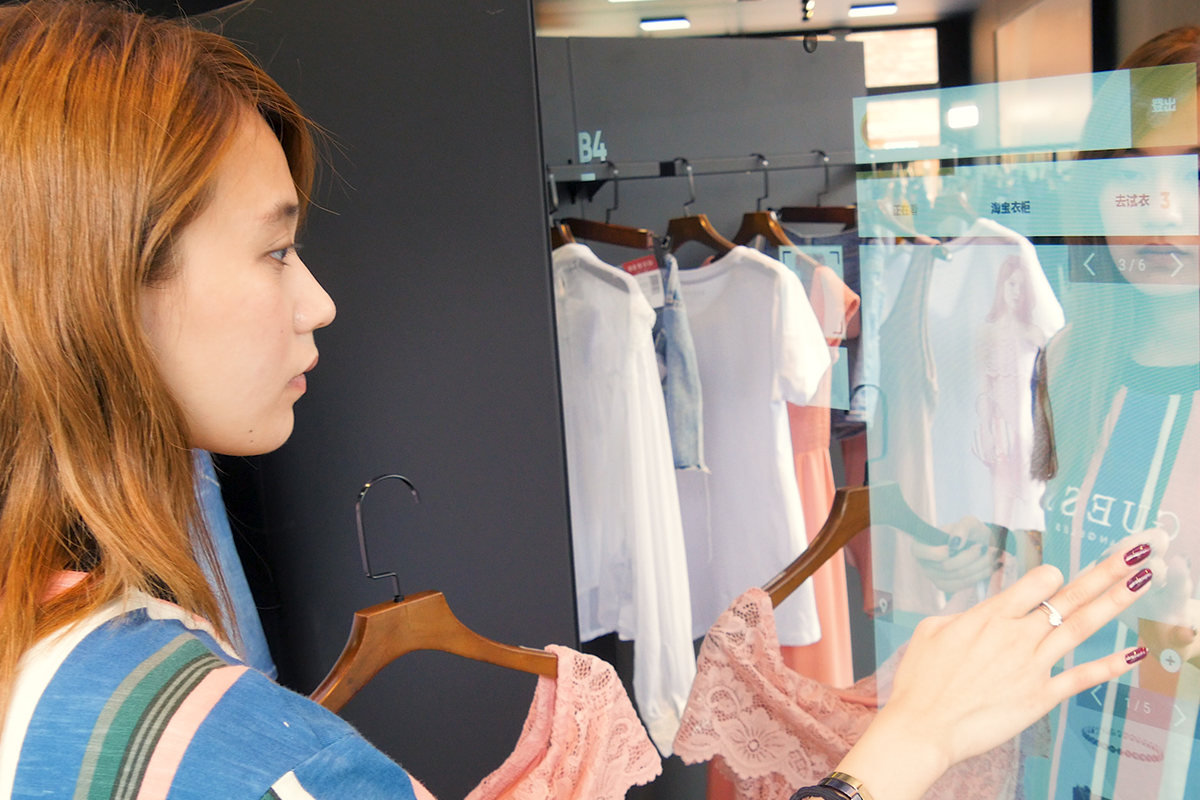A concept store at Hong Kong Polytechnic University, pairing Guess' retail collections with Alibaba's FashionAI project, offers a glimpse into how the American retailer's physical flagship stores in Hong Kong and Shanghai may be digitally transformed by year's end.
Guess has been buttoning up plans to be first global brand to digitise its stores after Chinese competitor Peacebird started last year.
The Guess concept store, which was open this week but closes tomorrow (7 July), features smart racks, smart mirrors and smart fitting rooms, underpinned by Alibaba’s FashionAI system. It offers up mix-and-match clothing and accessory suggestions from the Guess line, as well as items sold by others on Tmall and Taobao (Alibaba's B2C and C2C platforms, respectively).
The project is aimed at providing a better retail experience for shoppers and at using analytics to help fashion brands be smarter in ordering and maintaining inventory.
The system not only offers shoppers personalised recommendations based on their shopping histories, but also helps enhance visual merchandising, like what to dress Guess mannequins in. "We have 150 stores at this moment and it's very painful when product allocation fails and stock moves around without giving us the business performance we expected," said Blanco. "Once we analyse how the product is interacting with the customer, and vice versa, that will help the algorithms to learn and help us to adjust our strategy. From the consumer's POV, everything will be faster and better. Not only fashion insights but the retail experience inside the stores."
Added Zhuoran Zhuang, vice president of Alibaba Group, “Guess and Alibaba share the same vision to understand customer behaviors through artificial intelligence.”
Zhang said investments over the past seven years have contributed to the system’s capabilities in recognising clothing and spotting fashion trends, going beyond recommending items one at a time to proposing mix-and-match options to complete the look.
Guess launched its online shop on Tmall at the end of 2013, and according to the apparel brand, has achieved "more than 100% growth over the last three consecutive years".
Blanco wants to apply the technology to real stores as soon as "they [Alibaba] are confident to do so", he told Campaign China. "Our idea is to apply it everywhere in all countries wherever they [Alibaba] allow us to. And within this year, we will have some test stores in Hong Kong at Nathan Road and in Shanghai at Xintiandi."
As for marketing ROI, Guess is going for the softer metrics, through brand awareness and noise level on social media. "At this moment, the whole concept is focused on the product and the customer," Blanco said. Guess thinks it's good to begin from there and then scale up to higher levels of CRM where the brand integrates its customer database with Alibaba's.
"We are not scared of doing this," said Blanco, referring to possible privacy concerns. "We think sharing is giving more value than keeping it isolated." From the integration of online and offline CRM, the next level is social CRM, then social-media marketing, he said.

Here are the key features of Alibaba’s proprietary model that is based on consumer insights from its e-commerce ecosystem and images of more than 500,000 outfits put together by stylists on Taobao:
- AI-based mix-and-match suggestions: The technology can identify fashion elements including colour, styles, attributes (such as short or long sleeves, round or V-neck neckline) of a particular fashion item picked up by a customer, and provide recommendations on the smart mirror inside the Guess store. The mirror also has a 'Taobao Wardrobe' section, which shows the possibility of finding matching pieces from the Guess line inside the store or any of the shopper's previously purchased items on Taobao or Tmall.
- Smart locks equipped with gyrosensors, a Bluetooth Low Energy (BLE) chip and an RFID (radio-frequency identification) chip will be attached to each item. When touched or picked up by consumers, the item will be automatically displayed on the RFID-enabled magic mirror nearby.
- New fitting experience in which retail staff will be alerted by the in-store smart system and then prepare garments and accessories in the fitting area for consumers, avoiding the hassle of having to lug multiple products and sizes.
- Purchase records in the offline Guess store will be automatically reflected on consumers’ mobile Taobao or Tmall accounts.







